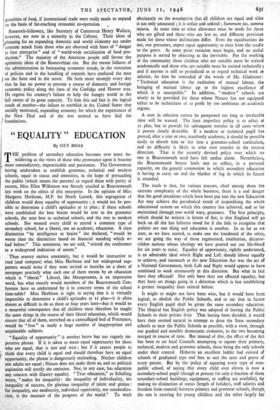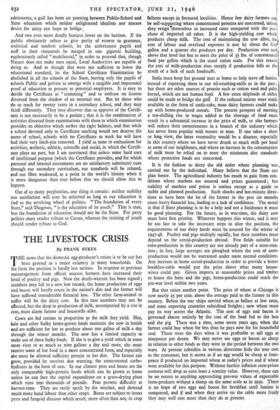" EQUALITY " EDUCATION
By GUY BOAS
THE problem of secondary education becomes ever more be- wildering as the views of those who pronounce upon it become more contradictory, impracticable and passionate. The Government having undertaken to establish grammar, technical and modern schools, equal in status and amenities, in the hope of persuading the public (which means the parents) to regard them with parity of esteem, Miss Ellen Wilkinson was fiercely assailed at Bournemouth last week on the ethics of this enterprise. In the opinion of Miss Margaret Herbison, M.P. for North Lanark, this segregation of children would deny equality of opportunity ; it would not be pos- sible to determine a child's aptitudes at it plus ; if these schools L. were established the best brains would be sent to the grammar schools, the next best to technical schools, and the rest to modern schools. She wanted every child to attend a common type of secondary school, for a liberal, not an academic, education. A class distinction " by intelligence or brains " she declared, " would be worse than the distinction based on financial standing which w,!. had before." This sentiment, we are told, " stirred the conference to a widespread indication of assent."
Thus oratory excites unanimity, but it would be instructive to read (and compare) what Miss Herbison and her widespread sup- porters would write if they were invited to inscribe on a sheet of notepaper precisely what each one of them means by an education which is " liberal." Liberal, like Mesopotamia, is an impressive word, but what exactly would members of the Bournemouth Con- ference have us understand by it in concrete terms of the school time-table? Miss Herbison is right in saying that it is virtually impossible to determine a child's aptitudes at II plus—it is often almost as difficult to do so three or four years later—but it would be a mournful consequence that all children must therefore be taught the same things in the course of their liberal education, which would ensure that all of them, stretched on a camouflaged bed of Procrustes, would be "free" to study a large number of inappropriate and unpalatable subjects.
"Equality of opportunity " is another brave but too vaguely im- pressive phrase. If it is taken to mean equal opportunity for those who are equal, that is just and wise ; but if it causes people to - think that every child is equal and should therefore have an equal opportunity, the phrase is dangerously misleading. Neither children nor adults are equal ; Nature does not make them so, and no political aspiration will rectify the omission. Nor, in any case, has education any concern with illusory equality. " True education," as Schelling wrote, " makes for inequality: the inequality of individuality, the inequality of success, the glorious inequality of talent and genius ; for inequality, not mediocrity, individual superiority, not standardisa- tion, is the measure of the progress of the world." To work
obstinately on the assumption that all children are equal and alike is not only unnatural ; it is unfair and unkind ; SUMMUM jus, summa injuria. At some time or other allowance must be made for those who are gifted and those who are less so, and different provision made for those whose inclinations differ. Even the equalitarians do not, one presumes, expect equal opportunity to exist from the cradle to the grave. At some point variation must begin, and no useful purpose is served by objecting to the inevitable. For the working of the community those children who are suitable must be trained academically and those who are suitable must be trained technically and if anyone is still so prejudiced as to regard technical work as inferior, let him be reminded of the words of Mr. Gladstone:
" Technical education is the exaltation of manual labour, the bringing of manual labour up to the highest excellence of which it is susceptible." In addition, " modern " schools are wisely to be provided for those whom Nature has not equipped either to be technicians or to profit by too ambitious an academic regime.
A start in selection cannot be postponed too long or invaluable time will be wasted. The least imperfect policy is to select at plus, but to provide for subsequent transfer in all cases where it proves clearly desirable. If a modern or technical pupil has proved, after a year or two, manifestly academic, it should be possible easily to absorb him or her into a grammar-school curriculum, and no difficulty is likely to arise over transfer in the reverse direction. That is the recently devised policy over which no one at Bournemouth need have felt undue alarm. Nevertheless, the Bournemouth breeze leads one to reflect, in a personal capacity, on the general commotion in which secondary education is having to carry on and the blanket of fog in which its future is stranded.
The truth is that, for various reasons, chief among them the extreme complexity of the whole business, there is a real danger that the good intentions which have been put into the new Education Act may achieve the paradoxical result of jeopardising the whole educational system on which this country has achieved, and so far maintained through two world wars, greatness. The first principle, which should be written in letters of fire, is that England will go back on all she has hitherto stood for if she fails to recognise that politics are one thing and education is another. In so far as we start, as we have started, to make one the handmaid of the other, we are going the way of those regimented, totalitarian, dictator- ridden nations whose ideology we have poured out our life-blood for six years to resist. Equality of opportunity, rightly understood, is an admirable ideal which Right and Left should labour equally to achieve, and inasmuch as the new Education Act was the act of a National Government, both Left and Right would appear to have combined to work strenuously in this direction. But what in fact have they effected? Not only have they not effected equality, but they have set things going in a direction which is fast establishing a greater inequality than existed before.
It might or might not have been wise, but it would have been logical, to abolish the Public Schools, and to say that in future every English pupil shall be given the same secondary education. The illogical but English policy was adopted of leaving the Public Schools to their private lives That having been decided, it would have then seemed natural to attempt to draw the State secondary schools as near the Public Schools as possible, with a view, through our gradual and sensible democratic evolution, to the two becoming merged in course of time. But instead of this, the effect of the Act has been to set local Councils attempting to equate their primary, technical, modern and grammar schools, these being the only schools under their control. Hitherto an excellent ladder had existed of schools of graduated type and fees to suit the taste and purse of every parent. But by the policy of equating every type of non- public school, of saying that every child over eleven is now a secondary-school pupil (though at present for only a fraction of them secondary-school buildings, equipment, or staffing are available), by making no distinction of status (length of holidays, staff salaries and freedom from control) between primary and grammar schools, though the one is catering for young children and the other largely for
adolescents, a gulf has been set yawning between Public-School and State education which neither enlightened idealism nor sincere desire for unity can hope to bridge.
And two even more deadly features lower on the horizon. If the public obstinately refuse to give parity of esteem to grammar, technical and modern schools, let the unfortunate pupils and staff in their thousands be merged in one gigantic building, euphoniously called " multilateral," in order to pretend that, though Nature does not make men equal, Local Authorities are capable of doing so. And as though that were not sufficient to lower the educational standard, let the School Certificate Examination be abolished in all the schools of the State, leaving only the pupils of schools Public and private to emerge with a tangible and impersonal proof of education to present to potential employers. It is easy to deride the Certificate as " cramming " and to enthuse on lessons divorced from the shadow of an external test. But let those who do so teach for twenty years in a secondary school, and they may think differently. They may discover that to approve of the Certifi- cate is not necessarily to be a pedant ; that it is the combination of activities divorced from examinations with those in which examination provides an objective which strikes the right balance, and that while a school devoted only to Certificate teaching would not deserve the name of school, schools with no Certificate to work for will have had their very linch-pin removed. I yield to none in enthusiasm for activities, aesthetic, athletic, scientific and social, in which the Certifi- cate plays no part, but I am convinced that unless some hard core of intellectual purpose (which the Certificate provides, and for which personal and internal assessments are no satisfactory substitute) runs through our secondary curriculum, our standards will be relaxed, and our fibre weakened, at a point in the world's history when it is more dangerous than ever before that we should allow this to happen.
Out of so many perplexities, one thing is certain: neither stability nor satisfaction will ever be achieved so long as our education is tied to the revolving wheel of politics. " The foundation of every State," said Diogenes, " is the education of its youth." That is true, but the foundation of education should not be the State. For party politics must render tribute to Caesar, whereas the training of youth should render tribute to God.



























 Previous page
Previous page